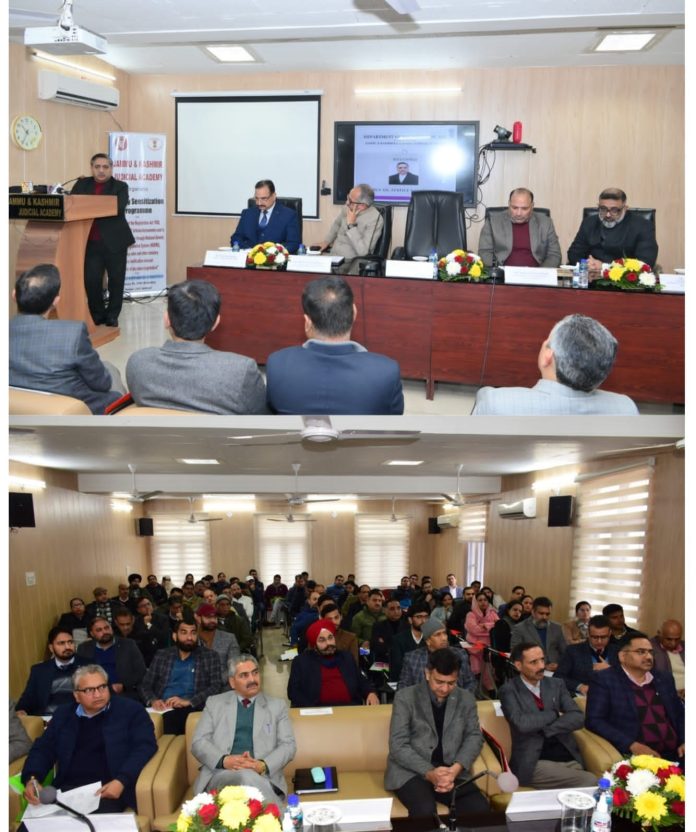JAMMU: Jammu and Kashmir Judicial Academy (JKJA) today organised a day-long sensitization programme for Registrars and Sub-Registrars of Jammu Province in collaboration with the J&K Registration Department at Judicial Academy, Janipur here.
The programme was organised with an aim to hone the skills and knowledge of officers and increase their efficiency in discharging their statutory duties more efficiently.
The training programme was inaugurated by Judge, High Court of J&K and Ladakh and Chairperson, Governing Committee, JKJA, Justice Sanjeev Kumar in the august presence of Judge, High Court of J&K, Ladakh and Member, Governing Committee, JKJA, Justice Rahul Bharti. Secretary Law Justice & Parliamentary Affairs, Achal Sethi; Inspector General of Registration, Sheikh Arshad Ayub; AIGR Kashmir, Sajad Hussain Ganai, and AIGR Jammu, Mansoor Aslam Choudhary were also present on the occasion.
Former District and Sessions Judge and President, District Consumer Commission, Jammu, Pawan Dev Kotwal and Former District and Sessions Judge and President, District Consumer Commission, Kathua, M.S. Parihar were resource persons for the training programme.
In his inaugural address, Justice Sanjeev Kumar highlighted the need to train the officers of Government who have been vested with the powers of Registrars and Sub-Registrars under the provisions of the Registration Act, 1908, and also deliberated on the need to learn from rich experiences of the Judicial officers who were earlier discharging those duties, particularly the adjudicatory part of registration. He appreciated the Registration Department for the historic step of computerization of registrations through technology-driven processes and procedures throughout the UT of J&K which in turn subsided the long wait for registration.
He also added that the J&K Judicial Academy aims to enhance the knowledge and expertise of Registrars and Sub-Registrars through this sensitization programme, contributing to the efficient and effective implementation of registration processes across the UT of J&K.
In his address, Justice Rahul Bharti stated that the DNA of registration has been with the Judiciary since the pre-independence era and it is a golden opportunity to transfer knowledge from the judiciary to the executive. He highlighted that registration is a time-bound process and needs to be accomplished within the shortest possible time period.
In his special remarks, Secretary Law, Achal Sethi highlighted that the abrupt change of laws in 2019 posed a challenge to officers with non-judicial backgrounds. He appreciated the Academy for organising the two training programmes on previous occasions which went a long way in ensuring smooth and hassle-free transition of document registration from the judiciary to the executive.
In his introductory remarks, Sheikh Arshad Ayub shared the history of developments in the field of registration since 2019 for a transparent document and registration regime. He exhorted the Registering officers to work tirelessly to facilitate the general public in the matter of registration of documents with a citizen-centric attitude. He also gave an overview of document registration through the National Generic Document Registration System (NGDRS), and numerous initiatives implemented to streamline the registration of documents.
Director, J&K Judicial Academy, Yash Paul Bourney in his introductory address emphasised the importance of organising such programmes. He also underlined the need for proper maintenance and preservation of the records in perpetuity so as to prevent fraud. He also emphasized the need to sensitize the Registering officers at the time of the entrustment of powers to them as Registrars and Sub-Registrars.
Resource persons, after giving an overview and salient features of the Registration Act, Stamp Act and the incidental matters, elaborated on the powers of the Registering Officers and the procedure required to be followed by them in the registration of documents. The rules framed for practice and working were also discussed, as well as the precautions which are required to be taken by the Registering officers.
Special emphasis was given to the need to adopt a uniform approach by all Registering officers to facilitate a smooth and hassle-free exercise of powers by Registering Officers. The incidental matters, as to payment of stamp duty, registration fee and the provisions regarding exemptions from payment of such duty and fee, were also elaborately discussed. Participants were engaged in a series of insightful sessions throughout the day, covering various aspects of the Registration Act and related matters.
In the interactive sessions, the queries of Registering officers were responded by the resource persons. The participants expressed gratitude for organizing such a valuable and informative training programme.


